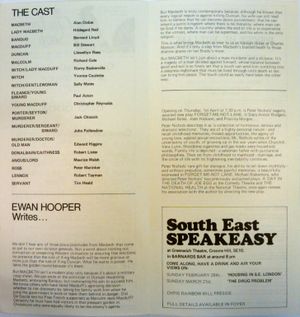DD135700
From WikiDelia
Revision as of 19:44, 23 May 2016 by Martinwguy (talk | contribs)
DD135700 is the inside fold of the theatre programme for the 1971 Greenwich Macbeth.
The cover is DD135629.
Transcript
THE CAST MACBETH Alan Dobie LADY MACBETH Hildegard Neil BANQUO Bernard Lloyd MACDUFF Bill Stewart DUNCAN Llewellyn Rees MALCOLM Richard Gale WITCH/LADY MACDUFF Romy Baskerville WITCH Yvonne Coulette WITCH/GENTLEWOMAN Sally Mates FLEANCE/YOUNG SWARD Paul Aston YOUNG MACDUFF Christopher Reynolds PORTER/SEYTON/MURDERER Jack Chissick MURDERER/SERGEANT/SWARD John Pollendine MURDERER/DOCTOR/OLD MAN Edward Higgins DONALBAIN/CAITHNESS Robert Lister ANGUS/LORD Maurice Walsh ROSS Peter Marinker LENNOX Robert Tayman SERVANT Tim Heald EWAN HOOPER Writes... We don't hear anu of those pious platitudes from Macbeth that come so pat to our own dictator generals. Not a word about rooting out corruption or preserving Western civilisation or ensuring free elections; no pretense that the rule of King Macbeth will be more glorious or more just than the rule of King Duncan. What he wants is power. He taked the golden round because it's there. But MACBETH isn't a modern play only because it's about a military coup d'etat. We can smile at the politician in Duncan rewarding Macbeth, embracing Banquo, but nominating his son to succeed him. We know others who have faced Macduff's agonising decision - whether to risk discovery by taking his family with him when he joins the government in exile or leave them behind in danger. Did De Gaulle test his Free French supporters as Malcolm tests Macduff? Certainly he must have had visitors in the pleasant garden in Chislehurst who were equally likely to be the enemy's agents. But Macbeth is truly contemporary because, although he knows that every logical reason is against killing Duncan, his wife can still lead him to believe that he can become above punishment, that he can inherit a sunlit kingdom where there is no morality; where man can be God if he dares. A country where the end of life is to experience to the utmost, where man can be superman, and his whim is the only religion. This is what brings Macbeth as near to us as Adolph Hitler or Charles Manson. And it's only a step from Macbeth's blasted heath to thise shallow graves on Ian Brady's moor. But MACBETH isn;'t just about a mass murderer and a dictator. It's a tragedy of a man divided against himself, whose balance between good and evil is so finely set that a touch can send him tumbling into a sleepless nightmare that must be lived through until death at last can bring him peace. The touch could so easily have been the other way. ---------------------------------------------------------------------- Opening on Thursday, 1st April at 7.30 p.m. is Peter Nichols' eagerly awaited new play FORGET-ME-NOT-LANE. It Stars Anton Rosgers, Michael Bates, Joan Hickson, and Priscilla Morgan. Peter Nichols describes it as 'a collection of humorour, serious and dramatic selections'. They are of a highly personal nature - and recall childhood memories, missed opportunities, the agony of young live, wasted sexual encounters. Mr Nichols writes of the uncertainty of youth, of growing up in the war years when Churchill, Vera Lynn, Woodbine cigarettes and gas masks were household words. Family life is depicted - a salesman father with puritanical philosophies. Then on from childhood to manhood - marriage, and the circle of life with its frightening inevitability continues. Peter Nichols' rare gift for dialogue, his ability to set down truthfully - and without prejudice, sometimes painful memories, is beautifully expressed in FORGET-ME-NOT LANE. Michael Blakemore, who directed Peter Nicols' two previously acclaimed plays, A DAY IN THE DEATH OF JOE EGG at the Comedy Theatre and THE NATIONAL HEALTH at the National Theatre, once again renews his asssociation with the author by directing the new play.
